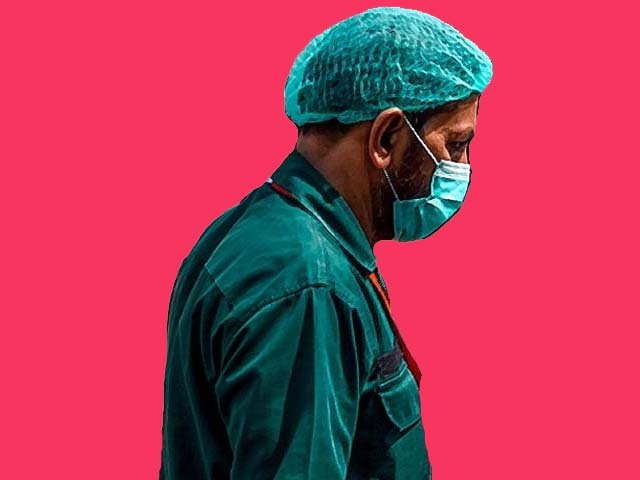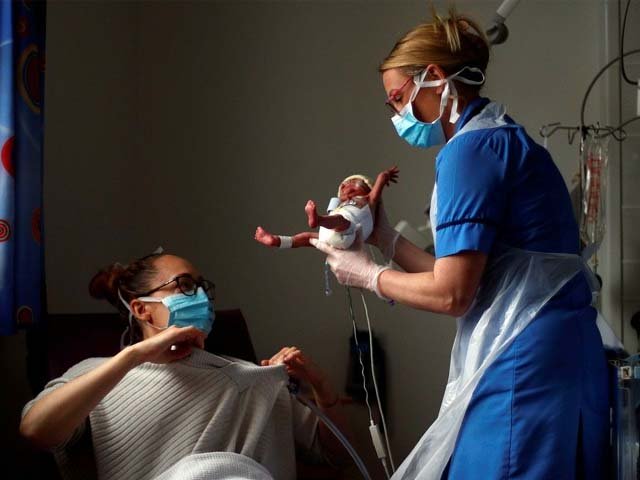
Pakistan’s doctors are battling Covid-19 and mob attacks
Healthcare staff and security officials must be trained with regards to handling potentially violent situations
Our healthcare system is currently on the verge of a crisis, the future of which is marred by uncertainty. The capricious trajectory of Covid-19, Pakistan’s flailing healthcare system, and the exponential rise in the coronavirus cases are just a few of the concerns. Amid these issues, many medical personnel have become the victims of public aggression themselves. With the onset of Covid-19 there has been a concurrent spike in the cases of violence and aggression against healthcare workers. On Friday, a mob stormed Civil Hospital Karachi and not only resorted to violence and vandalism but also took away the body of a patient forcefully, against the government assigned protocol. A similar incident occurred at Jinnah Postgraduate Medical Centre (JPMC) in mid-May. Unfortunately, even before the pandemic, violent attacks by patients’ relatives in hospitals were simply considered to be “part of the routine”.
In Pakistan, according to British Medical Journal, more than one third of the healthcare workforce (38.4%) has experienced some sort of violence in the past six months. But, during the prevailing Covid-19 situation, what are the igniting factors behind this consistent pattern of violence which has become a “violent pandemic” for the medical fraternity?
First in line to shoulder the blame is the weak and wavering leadership which is sending out confused signals to the public by lifting the lockdown and then subsequently threatening to re-impose it. This factor has only served to fuel disarray among the masses, who now consider the situation to be merely a ‘hoax or propaganda’, thus undermining the gravity of the issue. Secondly, the crucial decision regarding the allotment of ventilators solely rests upon the medical professionals, who must make this decision by studying the patient’s medical history and chances of survival. Even if it is the ventilator support system that is unable to save the life of the patient, it is blamed on the doctors.
Thirdly, the social stigma attached with the diagnosis of Covid-19 has had a multiplier effect for the already panicked caregivers, only adding more anxiety and stress, which they ultimately vent out in the form of aggression. Fourthly, the consistent repetition of a similar pattern of vandalism and violence also has its roots in non-existent medical professional protection laws. For instance, India has a Medical Protection Law which outlaws violence against physicians and property damage. Offenders can be imprisoned for up to three years with a fine of Rs 50,000.
Lastly, the meagre health budget, which has routinely made been less than one per cent of our GDP, remains the consistent problem. The more investment the state makes in enhancing the doctor to patient ratio (currently Pakistan is at 1001 doctors per one million people), the better the service delivery and response timing, and fewer incidences of violence.
These factors need to be addressed by undertaking emergency steps. The Covid-19 crisis presents an opportunity to reconsider and redesign governmental priorities and policies pertaining to healthcare workers.
Firstly, the installation of working CCTV cameras must be made mandatory for the hospital administration, particularly at sensitive areas such as entry points, exits of hospitals, patient waiting areas, as well as outside the emergency departments. Secondly, a well-integrated security system lies at the centre of a safe facility, and this must be ensured by harnessing technological tools. This would require the diversion of economic resources towards the healthcare sector in the range of at least three per cent of the GDP. A health facility’s security plan should include metal detection systems, panic alarms for the staff, restricted access capabilities, and safe staff rooms. Hospitals in particular require a unique approach, consisting of dual access to special wards (ICU/CCU/emergency wards) and main entrance doors, as well as internal access-controlled entrances and exits.
Thirdly, the healthcare staff and security officials must be trained with regards to handling potentially violent situations through formulated courses. The content may include de-escalation strategies and restraint techniques. Fourthly, it has become a necessity to link up hospital facilities with the nearest police station. Not only can they can carry out video surveillance of sensitive entry and exit points but this can also be helpful in reducing the police response time. Fifthly, to avoid overcrowding, hospitals should mandate a policy for limiting the number of patient attendants entering the waiting rooms of the hospitals to a maximum of two individuals.
Lastly, there must be a medical protection law in place which takes action against those who engage in violence. Even temporary emergency laws during Covid-19 could act as a safeguard against violent outbreaks at hospitals. For example, New York’s Governor enacted the “Emergency Disaster Treatment Protection Act” which provides temporary immunity from civil and criminal liability to New York healthcare professionals. It specifies that a resource/staff shortage shall not be considered as “intentional criminal misconduct, gross negligence, reckless misconduct, or intentional infliction of harm.” These kinds of laws lie at the heart of an effective securitisation strategy.
For doctors to be saviours they need to be protected first. The safety of those who are centre-stage, working day in and day out in the battle against Covid-19, has to be a key priority for the government. The medical fraternity, which has selflessly devoted itself to ward off the threat of Covid-19, at least deserves the security of their lives in line with Article 14 of the constitution of Pakistan. As analysts today are engaged in deep discussions about the post-Covid world, why not work towards shaping a violence and brutality free future based on mutual respect as well as stringent security laws?


COMMENTS
Comments are moderated and generally will be posted if they are on-topic and not abusive.
For more information, please see our Comments FAQ